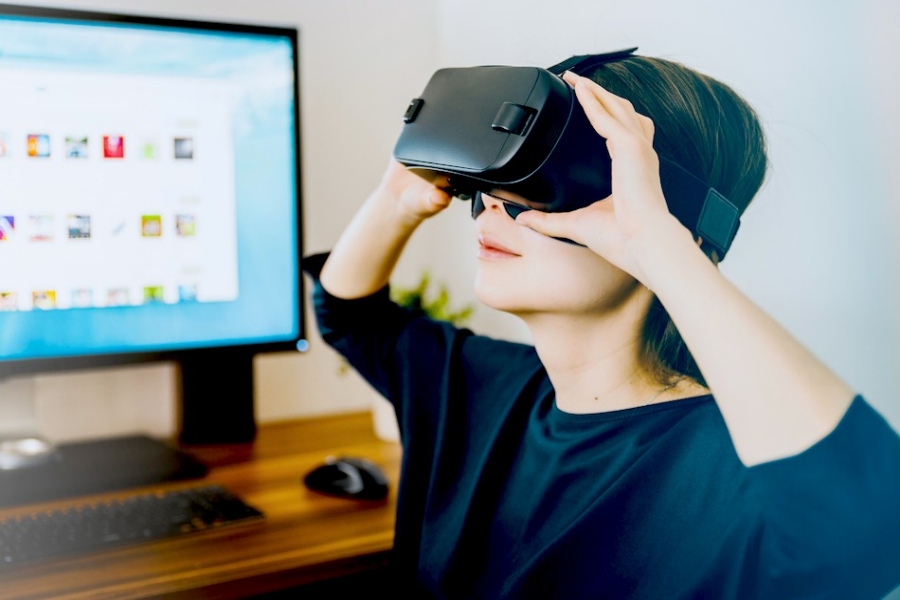Concordia Library is more than just a quiet place to study and a place to borrow books. Libraries have evolved with technological developments and student needs to become a services provider for academic support, both in terms of specialists who help with research and a hub for technological tools to enhance the learning experience.
New technologies have transformed the way libraries function and they became hubs for services that facilitate students’ research. For example, a subject-specific librarian helps navigate both online and offline resources; training is not just on citation guides, but also on reference management tools like Zotero; and spaces, like the visualization studio, offer free access to various digital tools.
We talked to Joshua Chalifour, the Journalism and Communication Studies Subject Librarian, and one of the Digital Scholarship Librarians at Concordia University Library, who shared with us the gems in terms of resources and technological tools available to optimize the research and the thesis’ writing process in graduate school.
Here you find five cool resources offered by Concordia library with no extra costs to graduate students:
1. Databases, data sets, printed articles and books from around the world
You are one click away from learning everything that has been published about your research topic, no matter the field. Concordia librarians are incredibly knowledgeable and resourceful about what is available in terms of scholarship, data sets, databases and rare books to help students to improve and speed up their research. There is a wide range of datasets at regional and national levels, and students can learn more about them in two of our workshops led by librarians: Canadian Statistics and Microdata for the Social Sciences and Mapping Montreal open data with ArcGIS Online.
Grad students can receive through their email copies of printed articles or book chapters from sources in the Concordia library or from an external library via the Inter-Campus & Article Delivery service. Interlibrary loans (Colombo) provides students with books from other libraries either in Canada or abroad. You should never pay for a subscription or book until after you have asked your librarian. There is a very good chance they can borrow it for you for free.
2. Equipment and workshops on emerging tech for programming, 3Dprinting, and VR productions
Technology Sandbox is Concordia Library’s collaborative space where students can learn by doing, making and sharing knowledge with each other on 3D modelling and printing, Arduino kits, Twitter bots, sewing machines, Linux basics and Raspberry Pi. Grad students have the opportunity to learn new technologies that might help them to present their research in a more interactive format.
The library recently opened the Visualization Studio, a high tech space part of Concordia next-gen initiative, that supports graduate students and faculty in learning, teaching and research with immersive and interactive visualizations and data analytics for all disciplines. Students can book the studio and receive basic training on the equipment available (virtual reality workstations, display wall with infrared touch, among others) given their research interests and technology needed to complete their projects.
3. Online streaming film and documentary databases
Concordia Library offers a wide range of online streaming options of films and documentaries and hosts a DVD collection covering a diverse range of genres, and sources such as documentary productions by the National Film Board (NBF) and Kanopy just to name a few.
4. Access to archival images in Canada and internationally
Researchers in image-based fields, such as art historians, historians, and fine arts can benefit from Concordia Library image digital collection. Many images are available under the public domain or Creative Commons rights, which you can use to illustrate your conference presentation, research and class discussion. This digital collection gathers all the public image databases such as Getty Images, Library and Archives Canada, and Smithsonian Institution Archive Collections just to name a few. Moreover, our library subscribes to image databases such as ARTstor Image database and Academic Search Premier (EBSCO) at no cost to Concordia’s students.
5. Primary source repository and Indigenous resources
You can access primary resources with significant cultural and historical value such as rare books, manuscripts and periodicals at Concordia Special Collections. These collections have an array of unique material in several disciplines such as music, theatre, political science, religion, and art history. There are materials from the history of Quebec and Canada, such as the Gay and Lesbian Literature Collection, and the Azrieli Holocaust collection, one of the most important specialized collections in North America on the topic.
Concordia library recently created a special section within its collection with Indigenous educational resources for faculty and students. A subject librarian is dedicated to helping professors with material on Indigenous topics with the view of decolonizing and indigenizing the university curriculum, with recommended scholarly and community-based resources.
To learn more about the Concordia libraries, set a meet with your subject matter librarian, drop by the information desk or sign-up for a joint GradProSkills and Libraries workshop.

